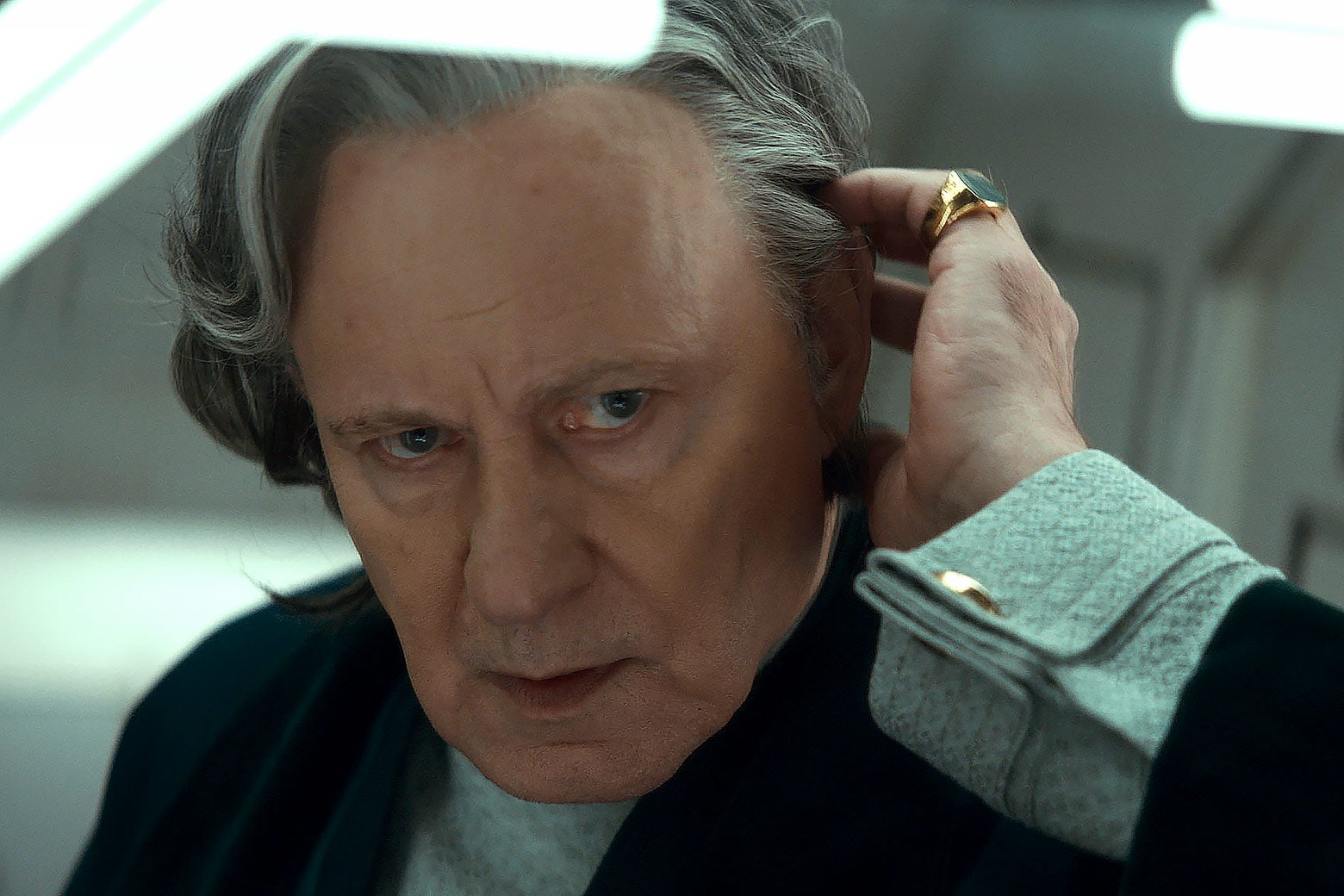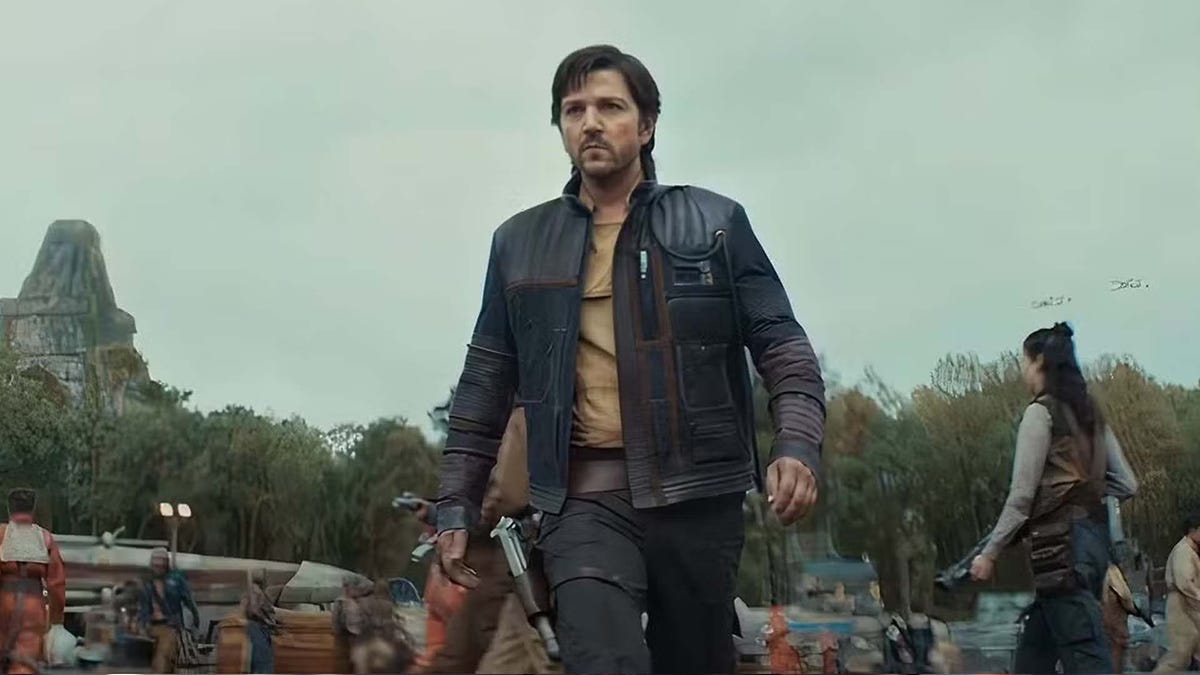The Greatest Star Wars Show Was Always Going to End in Tragedy, but I Still Didn’t See This Coming
Andor just made two of its most fascinating characters do the unthinkable.

This article contains spoilers for the final three episodes of Andor.
Top billing notwithstanding, Andor has never been a show primarily, or most interestingly, about how Diego Luna’s Cassian Andor went from lawless smuggler to self-sacrificing revolutionary. Star Wars has told that story before—you know, the one about Kylo Ren’s dad—and Andor’s two seasons have made it clear that what excites Tony Gilroy is the chance to poke around in areas that the live-action films, at least, have left unexplored. This is a narrative universe where people worry about what to cook their romantic partner’s mother for dinner, where they dance at parties and watch TV news—a fully imagined world that you could live, and not just fight, in.
So it’s fitting, and pointed, that Andor’s final batch of episodes—all written by Tom Bissell and directed by Alonso Ruizpalacios—begins with an episode in which Cassian is wholly absent. Instead, for the better part of an hour we focus almost exclusively on the relationship between the rebel spy Luthen Rael (Stellan Skarsgård) and his comrade Kleya (Elizabeth Dulau). While we were introduced to Luthen in the field before seeing him in the foppish garb he uses to pose as a high-end antiques dealer, Kleya has remained away from the front lines, serving as a kind of white-collar operative. She’s got nerves of steel, as we saw when she had to remove a listening device hidden in a forged relic while surrounded by Imperial officers, barely breaking a sweat as she wrenched at the stubborn bug until its metal cut into her flesh. But the blood that ran down her hand as she walked away was the first we’ve seen her draw.
Not so in this Episode 10, in which Kleya is forced to take on an especially dark and difficult task: killing Luthen before the Empire can torture him. The episode hinges on what, in plot terms, is the most consequential moment in all of Andor, when the Imperial double agent Lonni Jung (Robert Emms) tells Luthen of the existence of the Death Star. He doesn’t know it’s called that yet, or what its purpose is, but he knows that it’s a massively powerful weapon whose existence the Empire has gone to great lengths to conceal. Luthen receives Lonni’s information and vaguely reassures him that he can guarantee safe passage for Lonni’s wife and child, but we’ve known Luthen long enough to read the resignation on his face as he comes to the inescapable conclusion that his source has outlived his usefulness to the rebellion. Sure enough, the next time we see Lonni Jung, he’s sitting right on the bench where he and Luthen met, only now he’s got a blaster hole in his chest.
It’s not the first time Luthen has killed an innocent, or at least someone who wasn’t putting lives in imminent danger. (Just ask Mon Mothma what happened to her childhood friend, a resistance financier whose self-interest was greater than his dedication to the cause.) But it underlines his ruthlessness, his willingness to do what he perceives as necessary regardless of how morally murky it might seem. And that calculation is no different, and no more merciful, when the potential weak link is Luthen himself.
Sam Adams
Stars Wars’ One Truly Great TV Show Has Finally Found Its Moment
With the information the resistance has been seeking in his grasp and the urgency of conveying it to the rebel leaders at a premium, Luthen decides it’s time to close up shop, destroying the communications console concealed in the back room of his antiques store. But no sooner has he done it then there’s a knock at the door, where the Imperial Security Bureau officer Dedra Meero (Denise Gough) has come to survey his wares. What seems at first like spectacularly bad timing turns out to be worse: Dedra is on to Luthen’s scheming, and she tells him the shop is surrounded and there’s no escape. After years of searching for the rebel spy she calls “Axis,” Dedra’s so overwhelmed by her own achievement that she takes her eyes off her quarry, and Luthen grabs a ceremonial dagger from the items on display and plunges it into his chest.
Unfortunately for Luthen, he’s not quite ruthless enough. He’s mortally wounded but not yet dead, and Dedra rushes him to the nearest hospital, hoping to keep him alive long enough to be tortured. That leaves Kleya in a terrible bind. She’s the only person capable of conveying the existence of the Death Star to the rebel commanders, but she also can’t let Luthen live, for reasons personal and strategic. In a series of flashbacks, we learn that Kleya was once an orphaned survivor whom Luthen took under his wing. (What would Star Wars be without its wayward orphans and their mentors?) But Dulau plays Kleya’s horror at learning of Luthen’s fate so acutely that it renders the elaboration of their bond unnecessary. It takes only a look to understand that they were connected by more than shared political aims, and that she immediately both knows and dreads what she will have to do.
It turns out that Kleya, like Luthen, has been in costume all along, and beneath her cultured exterior lies the heart of a badass. She makes her way through the hospital, felling Imperial guards as she goes, thinking so far ahead of what should be the Empire’s top agents that they later assume that the operation must have been carried out by at least three people. (Blowing up a few cars via remote control didn’t hurt the feeling that she was everywhere at once.) And when she finally makes her way to Luthen, she does what has to be done, fulfilling the life he raised her to lead even at the cost of ending his own. It’s the ultimate sacrifice, for both of them.
It’s One of the Weirdest Mistakes in Movie History. I Spent Months Investigating How It All Went Wrong.
Judy Blume’s Most Controversial Book Is Now a Netflix Series. There’s a Radical Change.
This Content is Available for Slate Plus members only Critics Savaged Her Novel. It Sold Millions Anyway. Her New Book Has Something to Say to Them.
Netflix’s Breakout Comedy Star Finally Has His Own Movie. It Left My Audience in Stitches.
Although Andor was, by its nature, a series haunted by mortality, it was also one that could never follow its protagonist to the end of his journey (although I imagine that the Disney+ interface will be properly rigged to flow from the show’s last beat directly into Rogue One). But the space afforded to Luthen’s death makes it land especially hard, as does the rare departure from the show’s ensemble structure. His name, known to so few, is likely to be forgotten, his pivotal role in the rebellion never known to more than a small handful, but Andor stops to give him the honor he deserves, to measure the weight of his contribution. He’s not a hero in the conventional sense, and perhaps not in any sense, but this has never been a story that’s just about heroes.
For a series that’s been so intent on puncturing the mythos of the Star Wars saga—Gilroy described it as the equivalent of removing the Latin Mass from the Catholic Church—the extent to which its final moments are dedicated to linking back up with the mainline franchise feels like a bit of a letdown. (The moment when we see that Mon Mothma has traded the flowing locks of a galactic senator for her curt Return of the Jedi hairdo isn’t overplayed, but it still lands with a bit of a clunk.) But the show finds a way to point beyond the story we already know, the one we’ve been told so many times before. As Cassian readies the mission that will end in his death, we cut away to his former lover Bix (Adria Arjona), who abruptly left him when she realized that his attachment to her would prevent Cassian from carrying out his duty. And then we see why she felt that way, because she’s cradling his child. We know how his story ends, but this one is just beginning.
Get the best of movies, TV, books, music, and more.






















